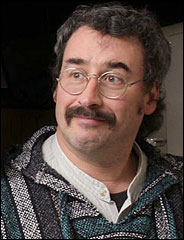
DANGEROUS [Brian Terrell, executive director of the Catholic Peace Ministry in Des Moines, had helped conduct nonviolence training at a November 15 forum on the Drake University campus. He received a federal grand jury subpoena last week]
I don't know why they're bothering with the small stuff, since we're not going to have a free election this November in any event, but the Administration's Department of Justice is trying to shut down ordinary protest, and in a very heavy-handed way.
In Des Moines, Iowa, that hotbed of revolution, the U.S. District Attorney's office has subpoenaed individuals and records related to the activities of antiwar protestors. The group had assembled in a forum on the campus of Drake University, a small private institution in the capitol, on the day prior to a pretty routine antiwar demonstration outside a National Guard base last November. The event was sponsored by the University's chapter of the National Lawyers Guild.
Officials at the University are unable to comment, since they are subject to an extraordinary "gag order" under a separate very broad federal grand jury subpoena directed at its relationship to the November 15 gathering.
The very public forum, atended by 21 people, was filmed by local television and the Des Moines police were invited. The program included the offering of personal safety advice for people who might decide to carry out non-violent civil disobedience the next day.
The school's subpoena called for detailed information on the lawyers guild and its members, including the names of those who are officers, and guild meeting agendas and annual reports since 2002.There can be only one explanation for this scrutiny from the Justice Department, a totally disproportionate response to the mildest of provocations: Silence all protest.The subpoena also focused on the Nov. 15 antiwar forum, asking for "all requests for use of a room, all documents indicating the purpose and intended participants in the meeting, and all documents or recordings which would identify persons that actually attended the meeting."
Some said it could send a chilling message far beyond Iowa, leaving those who consider voicing disapproval of the administration's policy in Iraq, or anywhere else, wondering whether they too might receive added scrutiny.Yes, but we're already there."I've heard of such a thing, but not since the 1950's, the McCarthy era," said David D. Cole, a Georgetown law professor. "It sends a very troubling message about government officials' attitudes toward basic liberties."
Anthony Romero, the executive director of the American Civil Liberties Union, said he feared news of the subpoenas which was spreading rapidly via e-mail on Monday among activist organizations might discourage people from showing up to protests, attending meetings at universities or even checking out library books.
"People will have to be asking themselves: will this be subject to government scrutiny?" Mr. Romero said.
[image by Mark Kegans for the NYTimes]